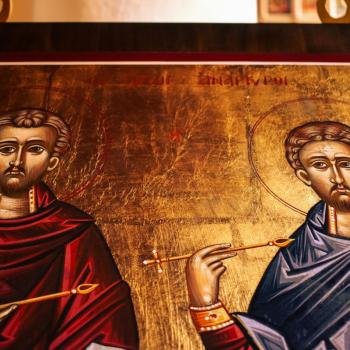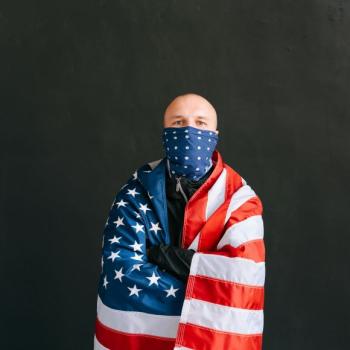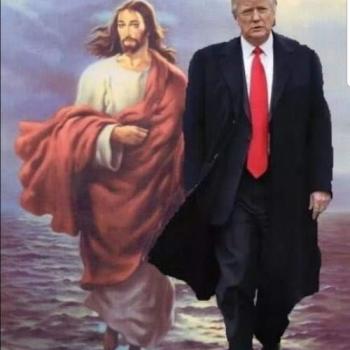
Evangelicals have managed to feint, dodge, even incorporate criticism as badges of honor. When they were labeled “The Deplorables,” they marketed the slur as a badge of honor and marketed t-shirts, mugs, and bumper stickers proudly declaring how sweet it was to be deplorable. Now, they face a judgement that comes with the fierceness of the four horses of the apocalypse. They face the judgment that always befalls idolaters from the Israelites frolicking before the golden calf, their ancestors placing Nehushtan (the bronzed snake) in God’s house, to the gods of Jezebel, Solomon, and an array of wicked kings of Israel and Judah, to the Market God and the political gods of modern evangelical evil.
They have stood by their man – Donald Trump – through all his failures, indictments, and incitements. Helgard Muller has even written a book – President Donald J. Trump, The Son of Man, The Christ. For Muller, the “J” in Trump’s name stands for “Jesus.”
I’m less alarmed by all this religious emphasis criticism than Right Wing Watch and many other liberals in the American establishment’s ability to co-opt and water down every evangelical ideology. My own fierce criticism of the evangelical political movement pales considering the danger that now faces the evangelicals.
The movement we call evangelical contains many elements. In its heart is a sincere and good-faith effort to stop the decline of our civilization. In previous decades, the evangelicals have produced movements that have advanced human rights for working people, women, and minorities. This history of evangelicals is inspiring and uplifting.
But evangelicalism has become weirder since inserting itself into secular politics. It involves preachers ranting against science – covid vaccines and climate change. Then there are people identified by the media as “evangelicals” that have no relationship to God, the church, or the Bible. “Evangelical” simply doesn’t mean what it once did.
Evangelicals started out wanting to save the world for Jesus and to care for the poor. They built a genuinely Christian counterculture. Oddly, as David Brooks notes, we saw this happen between the 1970s and the 1990s. American hippies built a genuinely bohemian counterculture. But as they got older they wanted to succeed. They brought their bohemian values into the market, but year by year those values got thinner and thinner and finally were nonexistent.
I believe there are certain spirits at loose that swirl in the evangelical culture that foretell its approaching demise.
The Spirit of the Secular
What happened to the hippie movement now is happening to the evangelical churches.
Our secular culture will co-opt the evangelical movement. There is evidence that this is already happening. The secular tide will sweep away the poisoned evangelical movement. The highly compromised nature of the church is hard to avoid. The religious and spiritual vacuity is stifling. How a people who worship a crucified God could include thirty-minute rants by the pastor about secular politics during Sunday gatherings is, as religious people like to say, a mystery. I, for one, believe it is a judgment of God.
Charles Taylor has offered the best diagnosis of the problem in A Secular Age. Taylor has observed how we’re all secular now. The secular touches everything. It not only makes unbelief possible; it also changes belief — it impinges upon Christianity (and all religious communities).
Churches like corporations co-opt almost unconsciously. During the 1980’s to the first decade of the 21st century, the evangelical churches poached most of the more conservative members of mainline churches over issues like gays and abortion and guns and immigrants. They sent powerful signals that they were the true keepers of the laws of God, while embracing a welcoming spirit as a form of marketing. By taking what was controversial and emotionally troubling as a defense of the gospel and America, they turned it into a product or a brand. Pretty soon key concepts like “freedom,” “biblical lifestyle,” “Christian worldview,” are reduced to empty catchphrases floating everywhere.
I believe our churches are caught in the clutches of the fear of death. The huge cathedrals dotting the landscape are the illusory means of sustaining status and well-being. “Look at us. We are alive. We are successful. We are really big.” But behind the glitter, the bright lights, the television cameras, the sexy stage, and the perfectly dressed-for-this-age preachers there is an increased anxiety about annihilation. As a result, the evangelical churches have become over-dependent on secular political force. The churches are caught in a vicious circle that linked the threat of death not to the Bible which says, “by my Spirit, says the Lord,” but to an ever-growing political and military response to enemies and threats to the American way of life, disseminating anxiety throughout the ranks to such an extent that the churches feel compelled to be more frenetic, more exciting, ever-louder, more sensational – all in the attempt to calm the alarm of the secular assault on the nation.
The Spirit of Capitalism
The evangelical church, long wed to the values of capitalism, spends inordinate amounts of energy pleasing the idol of Mammon. Capitalism is doing to the church what it did to the hippie movement.
Robert Jeffress bragged on the Lou Dobbs show: “Our church in downtown Dallas – we coer six blocks of downtown Dallas – we haven’t changed our message in 150 years because God’s word never changes. But our methods change. We are bursting at the seams. We are just adding a $35 million addition to take care of all the young families and children flocking into our church. God blesses a church that honors His unchanging word.”
The evangelical movement has embraced the prosperity gospel and the excesses of capitalism that trail in its wake. The competitive nature of the church business has one purpose: to funnel as many people into the pews as possible and to persuade them to give as much money as possible. BIGGER IS BETTER and MORE IS BETTER are the everyday metaphors that now control the evangelical movement.
The very fact that evangelicals worship the American idol of wealth – Donald Trump – says more about their greed than their political commitments. Trump constantly brags about how rich he is. Being rich was a major part of his political appeal. Evangelicals, already deeply invested in the ideology of the prosperity gospel, easily equated Trump to their successful, rich, corporate preachers.
The Spirit of Pragmatism
Third, there’s the evangelical power structure itself. Evangelicals have no patience with losing. They will turn on Trump they way they turned on Jimmy Carter.
One issue: Abortion. Trump is not the hard-core anti-abortion leader that evangelicals want. There are Republicans determined to win or die with an anti-abortion platform. Senator Tommy Tuberville is a case in point. He has made military promotions an abortion test vote.
The Republican responses to losing abortion ballots in a number of states has indicated how entrenched they are and how determined they are.
Ironic that the signature issue that evangelicals claim first energized them for political involvement – anti-abortion – may now be the millstone around their neck. The double irony is that anti-abortion was not the issue that originated The Moral Majority; segregation was the defining issue. Realizing they couldn’t win with a segregationist agenda, Republicans switched to abortion.
There will be no switching this time. In Republican post-mortems about the defeat in Ohio, there have been calls for tweaking the language and doing a better job with the messaging. That, of course, is political folderol. No language or message strategy will change the nation’s understanding of how virulently anti-abortion the movement has become.
But evangelicals will not go down with the Trump ship. They are literally pragmatists. Pragmatism has become a synonym for evangelical.
One Different Spirit: Revival
As crazy as it may sound, I believe the political evangelical church reaches its end when one of its own feels called by God to begin a revival movement among evangelicals. A “Great Awakening” will occur in America. The Calvinists may produce a new Jonathan Edwards. But someone will arise. God will not sit by and watch his church consumed by the idolatry of nationalism and secular politics. One will arise like John the Baptist to call the church back to its primary purpose.
There are evangelical leaders with the power to stop the Trump Show. If these leaders endorse other Republican candidates, the evangelicals will fall in line. They are a cohesive group, and they will march together. There are hints that Trump might be in trouble in Iowa because the evangelical leader in Iowa, Bob Vander Plaats, has not endorsed Trump and is said to be poised to endorse a different candidate.
The end of the political evangelical church movement would be fine with me. As I say, there are (at least) two evangelical movements. One focuses on the gospel of Jesus and concrete benefits for the disadvantaged — caring for the least of these. The other instigates a secular political war against imaginary enemies.
If we can have a revival of the original evangelical movement and less of the current mess of political involvement, we’ll all be better off.













